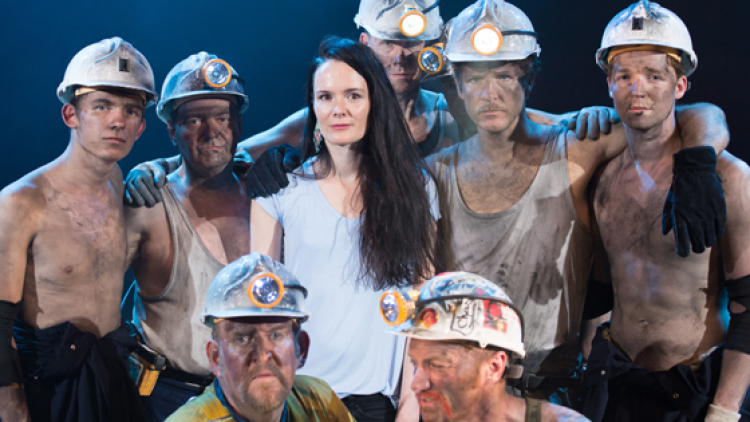Writing Wonderland: An interview with Beth Steel
Posted on 12 June 2014.
Posted in: HT Blogs

Wonderland Writer Beth Steel talks to Hampstead Theatre’s Online Features Editor, Susie Benson, about the inspiration behind her new play and bringing such an ambitious story to stage
‘You walk for two hours. You look in front of you and there’s nothing. You look behind you and there’s nothing. It’s pure silence. Then you walk on and see a blue liquid light from machinery. Can you imagine what that’s like in that kind of environment? It blew me away.’
Beth Steel, author of Wonderland, is describing the first time she visited a mine. Before writing her extraordinary Main Stage debut play about the clash between government and miners in 1984, she had not been down to a coalface, although Steel’s father has worked in mines all his life and she grew up in a pit village. Her father told her categorically that she would never pull off a visit, as no woman had been down a mine since the 1980s. However, he was underestimating his daughter’s tenacity. As she says, if you’re going to evoke mining life, ‘the play has to have mining logic: you’ve got to understand the work to a reasonable degree.’ So Steel wrote a series of persuasive letters to the right people, and was eventually granted access. That first visit was extraordinary, not only because the mine was absolutely nothing like she imagined, but she suddenly realised how important it was to her father that she understood the Wonderland he was showing her.
‘He was worried I’d think it was dirty and horrible’, she says. ‘And yes of course it is those things, but it is also magnificent… It’s as otherworldly as Mars. Understandably people think of mines as being poky tunnels, but they’re like the set of the first Alien film. Lime bags hang from the ceiling, like pregnant alien pods, which rip open and change the chemicals in the air if there’s an explosion.’
We’ve grabbed an hour during the first week of rehearsals, which have been moved to Hampstead Town Hall to accommodate a theatre already bursting with preparation for multiple, imminent productions. Sitting in a small, window-less room next to a creaking lift shaft feels rather an appropriate place to talk mining. In this gloomy setting, Beth Steel is stunning and hilarious; her earthy observations have me cackling and gasping ‘really?’ for most of the interview.
Steel wrote two completely different plays about miners before deciding to write about the Strike. These initial plays featured the pit and the miners’ world down there, but through a narrower lens, focusing more on the experiences of just one family. When the realisation dawned that neither of these plays was what she really wanted to say on the subject, she persevered. A dedicated re-drafter, she says she believes that the ‘right play is always out there’, and it is her job to find it.
Digging deeper into the topic, her research uncovered the massive political and economic drama around the strike. This was not just a story about ‘the pits and men calling each other scabs’. Key protagonists like Secretary of State for Energy Peter Walker, the National Coal Board’s Ian MacGregor, and enigmatic fixer David Hart leapt into the foreground, and suddenly she had the broad perspective needed to dramatize the contextual rationale behind the decisions taken by government. She describes it as the moment in research ‘where it stops being pages in books, and it kicks your door down. All of a sudden the research comes alive: the past has to scream into the present. You go “oh now I’m excited about it”’. Her story now ranged from Westminster to the bottom of a mine shaft to battles with police, so Steel re-envisioned the play as an ensemble piece, comparing the democratic ‘spreading out’ of the work of an ensemble to the shared labour down a mine where ‘every man and every job is important’.
Her father hasn’t read the play yet, but will be coming to see it. Steel says it will be a big moment for both of them, not least because her family could not understand why she wanted to take on the 1984 Strike. She had only one five-minute conversation with him about the Strike, because of the emotion it still engenders. Part of Steel’s skill in writing this big, political drama, is the way she counterpoises the view in Westminster and the economic argument, against the miners’ fear of privatisation. Steel describes nationalisation as having been the realisation of a ‘dream’ for generations for miners, who had fought their entire lives for it, because it represented a massive step forward in terms of protecting the rights and safety of workers. She tells me that men cried when it finally happened in 1946. Her father is a Deputy, responsible for maintaining a mine’s working conditions, so they worked throughout the Strike to keep the mines operational. He was at Welbeck, featured in the play, before moving to Thoresby Colliery, due to close later this year.
Wonderland was written partly out of a desire to recreate the world of the miner before the Strike. Her characters are fictional, but do of course draw on people remembered from childhood. The play is often very funny, with Steel using humour to communicate solidarity and hierarchy: ‘I think you really honour something when you don’t sentimentalise it, when you don’t take out what is horrible and degrading and tough and dangerous about it. The minute you don’t include the complications, you’re doing it a disservice. The men can still love this world despite all its complications. It is like how you feel about your family.’
Steel left school at sixteen, ‘having only read books I was told to read at school’, and took off to Greece with her twin sister to model fur coats by a swimming pool. At eighteen she opened a clothes shop out in Greece, but had closed it by the age of twenty-one. Pitching up in London in her early twenties, she went on a cultural rampage through galleries, museums, and theatres. One night she saw David Harrower’s Blackbird, and for six months afterwards walked round with the script in her bag, believing that if she could really deconstruct the play and get it into her bones, she would understand something about writing.
She obviously picked up a little something, because on the back of her first play, a ‘Harrower tribute’, she was accepted onto The Invitation Group of ten writers at the Royal Court. That acceptance and recognition provided the much-needed boost of self-belief to carry on. There was a stint on the Theatre 503 writer-attachment programme, and then she wrote the futuristic Ditch, which was accepted first by HighTide, and then by the Old Vic Tunnels. However she still needed her particular brand of tenacity when she first sent out Wonderland. Theatres were slow to respond because of the size of the cast and epic ambition of the play – this was not a play that could be performed in a studio space. She enlisted the help of Ian Rickson, former Artistic Director at the Royal Court, and James Grieve at Paines Plough, who both championed the play after reading it. However, doors were not opening quickly enough for Steel, and she was dismayed when an industry figure said it would never reach a Main Stage because she was an unknown.
However, Edward Hall then read Wonderland over Christmas 2013, and Steel was invited to Hampstead to meet him, with Executive Producer Greg Ripley-Duggan and Literary Manager Will Mortimer. She wasn’t nervous because she assumed she was just being invited in for a chat. It was a memorable first meeting.
‘I think we all felt it. We met, and I loved them because I thought that they really loved the play for what it is. They didn’t want it to be something else. When I left that office, I just knew that we were going to work together.’
Following the sell-out success of Sunny Afternoon, Hall must be relishing Wonderland’s theatrical scope in terms of its sweeping content, large ensemble, music and humour. Steel says that Hall’s treatment of the play is ‘astonishing’, praising his way of creating flow and fluidity, and his deft focusing on the ‘big structure’. She also loves Hall’s practical and minimalist approach to development, which involved an initial read-through with actors, followed by two full days of Hall and Steel interrogating key aspects, with Steel re-drafting where relevant. She sensed immediately in that first meeting that the team really understood what she wanted to achieve with the play, and wouldn’t ‘bring it down’. Her confidence in them was such that when Hall asked Steel in that first meeting how she wanted to proceed in an ideal world, she was very clear:
‘I said, “I want the ring on my finger. We do this now. I want the commitment now.” It’s only now I can’t quite believe I told the Artistic Director of Hampstead Theatre to put a ring on my finger in our first meeting!’
Wonderland runs on the Main Stage 20 June – 26 July 2014
Most viewed
- Wonderland: In rehearsals Read full story
- Video: Writer and Director introduce Wonderland Read full story
- Video: Meet the Wonderland cast Read full story
KEEPING YOU SAFE AT HAMPSTEAD

RESPECT PERSONAL SPACE

FACE MASKS ENCOURAGED

STATE OF THE ART VENTILATION

ENHANCED CLEANING

CONTACTLESS TICKETS

HAND SANITISING STATIONS

CASHLESS PAYMENT
